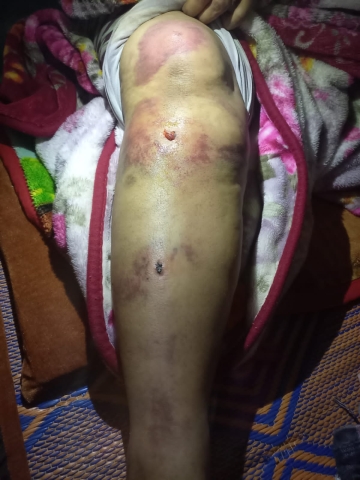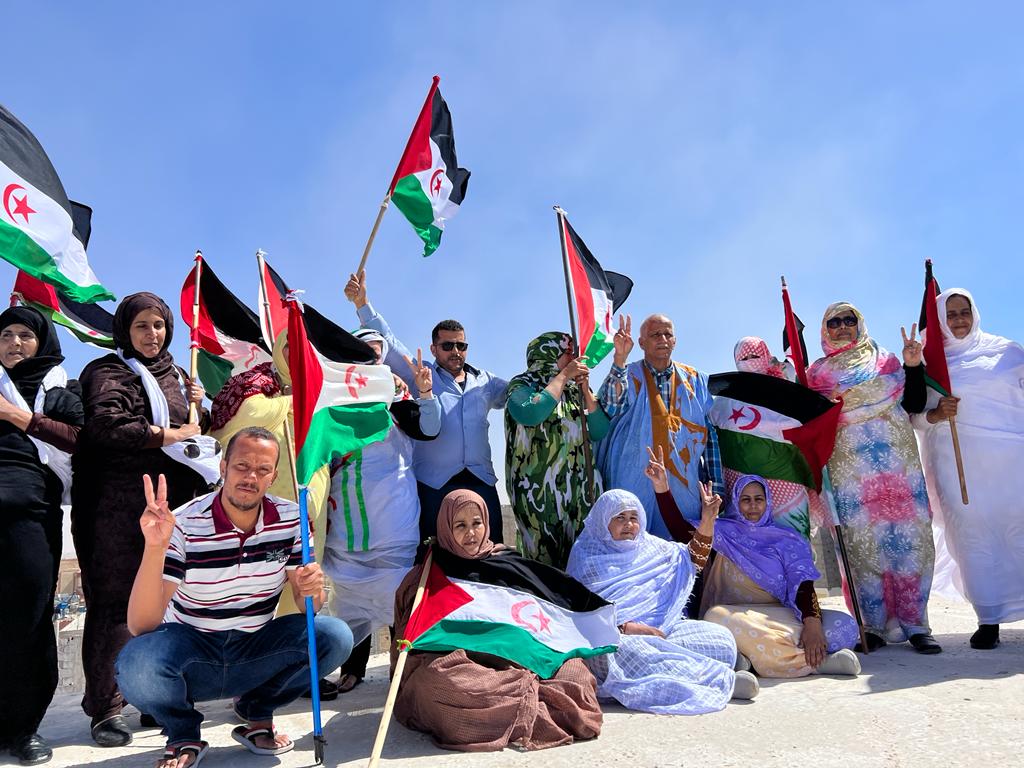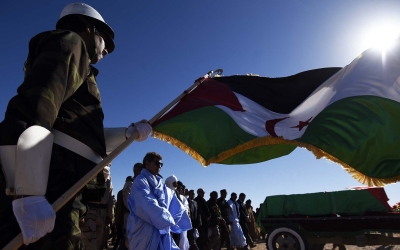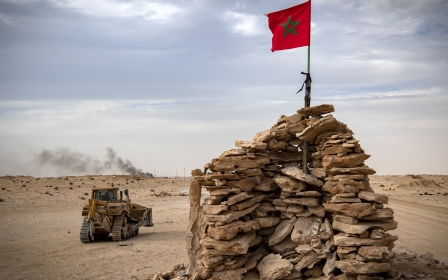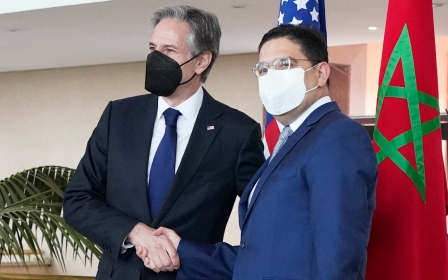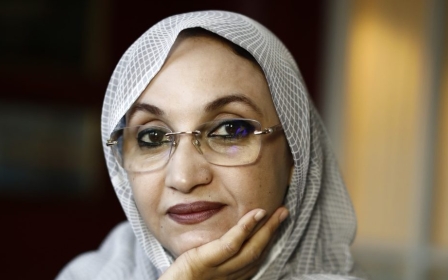Western Sahara: Women activists say they face rape, house arrest and forced divorce
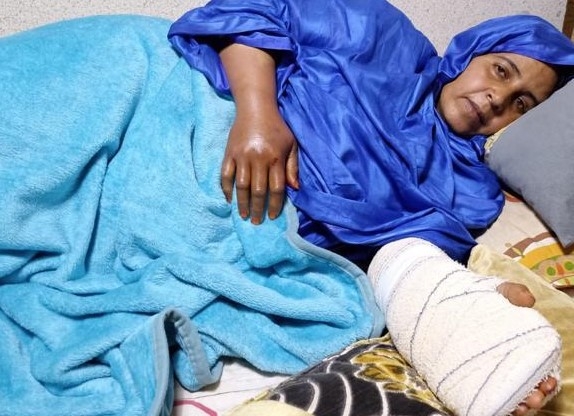
The photos shared by Mbarka Mohamed al-Hafiz and Fatima Mohamed al-Hafiz paint a stark picture of the abuse the sisters say they received at the hands of Moroccan police.
The two women, activists from the city of Boujdour, in Moroccan-controlled Western Sahara, are both still covered in cuts and bruises and currently trapped in their homes, facing, they say, more brutality from the security services who are still monitoring their every move - if they attempt to leave.
New MEE newsletter: Jerusalem Dispatch
Sign up to get the latest insights and analysis on Israel-Palestine, alongside Turkey Unpacked and other MEE newsletters
Both Mbarka and Fatima are part of a group of female activists who had been campaigning on behalf of another prominent local human rights activist, Sultana Khaya. The sisters describe themselves as coming from a "political family", including one brother serving a 10-year jail sentence for links to Western Sahara's independence movement.
Khaya, who has been under effective house arrest since November 2020, is a member of the Sahrawi community, the indigenous people of Western Sahara who advocate for independence.
“I was mostly beaten on my head and my head still hurts me. Also on the rest of my body, but mainly my head and face," said Mbarka, speaking from her home about Sunday's attack.
Her sister Fatima, who lives nearby, had a similar experience. After being followed from her house by two masked men, a grey Mercedes drove up in front of her.
"[Police] jumped out of the car and the two that were at my back, they came directly to me together with the three from the Mercedes, and they started beating me up until I was bleeding," said Fatima.
"I was beaten on my hands and my feet and they continued beating me until they made sure I'd fainted."
Afterwards, a neighbour attempted to take her back to her house - at which point she was attacked again.
Injected with an 'unknown substance'
According to the League for the Defence of Human Rights and against Plunder of Natural Resources, a human rights group of which Khaya is the president, she has faced repeated sexual assaults from police officers in her own home since being trapped there, as have, say the organisation, her sisters.
On 30 November 2021, Amnesty International issued an urgent action call "to put an immediate end to the brutal attacks against Sultana Khaya and her family and to carry out a prompt, thorough, independent, impartial, transparent and effective investigation into the security forces’ abusive force and attacks against her and her family, including the report of rape and sexual assault, and ensure that those suspected to be responsible are brought to justice in fair trials".
At one point, in December 2021, Khaya said she was injected with an "unknown substance" while her other family members were attacked and assaulted by police.
Mbarak and Fatima had been trying to push for her release, but say they have now found themselves placed in a similar situation.
On Saturday, the two sisters and six other activists - Zainabu Babi; Fatma Babi; Hajitna Babi; Um-El-Muminin Abdallah Brahim; Maluha Mohamed al-Hafiz; and Balla Mohamed al-Hafiz - were placed under virtual house arrest while their streets and neighbourhoods were blocked off by police.
Zainabu Babi appeared to have been subjected to particular brutality. Videos and pictures sent to MEE showed her in a wheelchair with broken hands, which she reportedly suffered while being detained by Moroccan police.
Foreign solidarity
Despite the alleged repeated sexual violence meted out against her and her family, Khaya has continued to speak out, repeatedly posting videos from the roof of her house proclaiming her opposition to the Moroccan presence in Western Sahara, which has been ongoing since the erstwhile Spanish Sahara was ended in 1975.
Her situation improved on 16 March, however, when a group of foreign human rights activists joined her at her house, in an attempt to prevent further incursions by the Moroccan security forces.
Speaking at a live webinar on Wednesday, broadcast directly from Khaya's house, she hailed the presence of the American activists as a "candle" in the darkness but lambasted the attacks on her comrades.
“We are struggling as peaceful women… they beat us, they torture us, they cut our salaries… but this will not stop me or my friends from struggling," said Khaya.
"We are tortured as women because our weapon is our flag. We didn’t throw stones, we struggled in a peaceful way. We believe in a peaceful process and still believe in it."
The Hafiz sisters said the protection that the presence of the US passport holders had given, enabled them to visit Khaya for the first time in a long time.
However, they now feared that they were being targeted in her place.
“I decided to go to visit Sultana [Khaya] after 12pm and when I came out of my house – two metres from the door – there was a car, a Mercedes," said Mbaka, describing Sunday's attack.
Six policemen in civilian uniform jumped out of the car and started beating her up and warned that if she attempted to visit Khaya again she would be killed.
“I said ‘I'm just going to the supermarket. I'm just going to buy some food’,” said Mbaka.
She said the men forced her back inside her house while her "seven-year-old [son], was screaming outside”.
“And when I tried to come out, they beat me again and they put me back in the house and I'm still under surveillance," she said.
Pressure on husbands
In addition to the violence allegedly used against the female activists, the Moroccan authorities have increasingly piled pressure on the husbands of the activists to curtail their campaigning.
'I'm not proud of being with someone that accepts this and gives up in front of the pressure of the occupation'
- Mbarka Mohamed al-Hafiz, activist
Both Mbarka's and Fatima's husbands were spoken to by the Moroccan intelligence services, who warned them to stop their wives from engaging in activism - or divorce them. They said they risked their salaries being cut otherwise.
Fatima said her husband had resisted the pressure, describing him as a "fighter defending freedom for people from Western Sahara" who had, regardless, been placed in a similar situation before.
Mbarka's husband, however, chose to divorce her.
Mbarka, who is still bitter at her husband's decision, said she instead had chosen "to be free, to be independent and to actually continue my struggle".
"I'm not proud of being with someone that accepts this and gives up in front of the pressure of the occupation," she explained.
"So for me, it is better to just get divorced, when he just ignored the lives we had together and the years we spent together.”
Global indifference
The ongoing violence meted out against Sahrawi activists comes as many world powers have increasingly acquiesced to Moroccan demands that they recognise the kingdom's sovereignty over Western Sahara.
One of the biggest shifts came in December 2020, when outgoing US President Donald Trump acknowledged Moroccan sovereignty over the territory in return for the kingdom recognising Israel.
Despite provoking widespread criticism of this break with longstanding US foreign policy at the time, the Biden administration has shown no indication that it plans to reverse Trump's move, while US State Department documents appear to show Western Sahara as part of Morocco.
Another major shift came last month when Spain - also breaking with many years of established national and EU policy - publicly backed a plan by Morocco to grant nominal "autonomy" to Western Sahara, while also maintaining the kingdom's overall control of the territory.
The move led to Algeria withdrawing its ambassador to Spain and the Polisario Front, who have fought to end Moroccan control of Western Sahara, breaking off communications with the country.
However, the move enabled Spain to patch up its previously rocky relationship with Morocco, after the kingdom had cut diplomatic support following Spain's allowing of a Polisario leader to leave its territory.
Spain's action has left a bitter taste in the mouths of many Sahrawi activists.
"We see a big solidarity movement in Spain, but at the same time, the Spanish authorities are supporting the illegal occupation that's still going on in occupied Sahara," said Fatima.
However, she added that despite these grim developments, she and her colleagues would keep fighting, even if the world was no longer interested.
"In Boujdour we have this battle, the Battle of Sultana Khaya... the Moroccon intelligence services, the Moroccon state, in general, doesn't accept her (Khaya) raising up the Sahrawi flag up to her house and for us also, we are forbidden to raise up the Sahrawi flag," she explained.
"So this is what's made us increasingly under repression, because we are determined to challenge Moroccan repression and to continue the struggle."
This article is available in French on Middle East Eye French edition.
Middle East Eye delivers independent and unrivalled coverage and analysis of the Middle East, North Africa and beyond. To learn more about republishing this content and the associated fees, please fill out this form. More about MEE can be found here.


